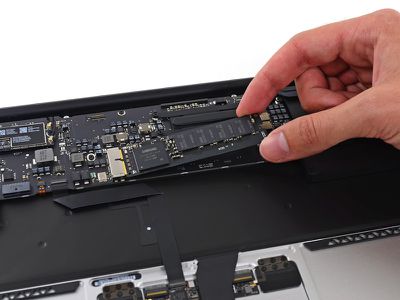Teardown of New Mid-2013 MacBook Air Reveals Smaller SSD, Increased Battery Capacity
The teardown experts at iFixit have just taken apart the new 13-inch Mid-2013 MacBook Air that was announced at Apple's Worldwide Developers Conference keynote yesterday, and while there aren't too many drastic changes in the internals there are a few differences that are worth noting.
The team found that the PCIe-based SSD module from Samsung is smaller than the previous model's Toshiba SATA module, which also means that the drive is not compatible with previous MacBook Air models. As noted earlier by AnandTech, the read/write speeds of the flash storage approach 800 MB/s.
 Samsung SSD in Mid-2013 MacBook Air
Samsung SSD in Mid-2013 MacBook Air
When Apple announced the Haswell-based MacBook Airs yesterday, perhaps the main highlight of the introduction was the "all-day" battery life topping out at 12 hours for the 13-inch model. And while the processors are a large part of the claimed all-day battery life, iFixit found that the new Airs also sport batteries with increased capacity driven by higher voltages: increasing from a 7.3 V, 6700 mAh power battery to a 7.6 V 7150 mAh power battery.
Other changes that the iFixit team found include a redesigned AirPort card that provides 802.11ac Wi-Fi and an expanded heat sink covering both the CPU and platform controller hub (PCH), although the PCH does not have any thermal compound applied to assist with transferring heat to the heat sink.
The 11-inch MacBook Air starts at $999 with a 128 GB hard drive, while the 13-inch MacBook Air starts at $1099 with a 128 GB hard drive. Both lines are available at Apple's Online Store and at the company's retail outlets.
Popular Stories
Apple is not expected to release a standard iPhone 18 model this year, according to a growing number of reports that suggest the company is planning a significant change to its long-standing annual iPhone launch cycle.
Despite the immense success of the iPhone 17 in 2025, the iPhone 18 is not expected to arrive until the spring of 2027, leaving the iPhone 17 in the lineup as the latest...
Language learning app Duolingo has apparently been using the iPhone's Live Activity feature to display ads on the Lock Screen and the Dynamic Island, which violates Apple's design guidelines.
According to multiple reports on Reddit, the Duolingo app has been displaying an ad for a "Super offer," which is Duolingo's paid subscription option.
Apple's guidelines for Live Activity state that...
Apple is planning to release a low-cost MacBook in 2026, which will apparently compete with more affordable Chromebooks and Windows PCs. Apple's most affordable Mac right now is the $999 MacBook Air, and the upcoming low-cost MacBook is expected to be cheaper. Here's what we know about the low-cost MacBook so far.
Size
Rumors suggest the low-cost MacBook will have a display that's around 13 ...
Govee today introduced three new HomeKit-compatible lighting products, including the Govee Floor Lamp 3, the Govee Ceiling Light Ultra, and the Govee Sky Ceiling Light.
The Govee Floor Lamp 3 is the successor to the Floor Lamp 2, and it offers Matter integration with the option to connect to HomeKit. The Floor Lamp 3 offers an upgraded LuminBlend+ lighting system that can reproduce 281...
Now that the calendar has flipped over into January, steep discounts on popular Apple products have become more rare after the holidays. However, if you didn't get a new pair of AirPods recently and are looking for a model on sale, Amazon does have a few solid second-best prices this week.
Note: MacRumors is an affiliate partner with some of these vendors. When you click a link and make a...
Belkin today announced a range of new charging and connectivity accessories at CES 2026, expanding its portfolio of products aimed at Apple device users.
UltraCharge Pro Power Bank 10K with Magnetic Ring
The lineup includes new Qi2 and Qi2.2 wireless chargers, magnetic power banks, a high-capacity laptop battery, and USB-C productivity accessories, with an emphasis on higher charging...
With the release of iPadOS 26.2 and macOS Tahoe 26.2, Apple has improved the Wi-Fi speeds for select Macs and iPads that support Wi-Fi 6E. Updated Wi-Fi connectivity specifications are listed in Apple's platform deployment guide.
The M4 iPad Pro models, M3 iPad Air models, A17 Pro iPad mini, M2 to M5 MacBook Pro models, M2, M3, and M4 MacBook Air models, and other Wi-Fi 6E Macs and iPads now ...
Apple plans to introduce a 12.9-inch MacBook in spring 2026, according to TrendForce.
In a press release this week, the Taiwanese research firm said this MacBook will be aimed at the entry-level to mid-range market, with "competitive pricing."
TrendForce did not share any further details about this MacBook, but the information that it shared lines up with several rumors about a more...
 Samsung SSD in Mid-2013 MacBook Air
Samsung SSD in Mid-2013 MacBook Air 






















